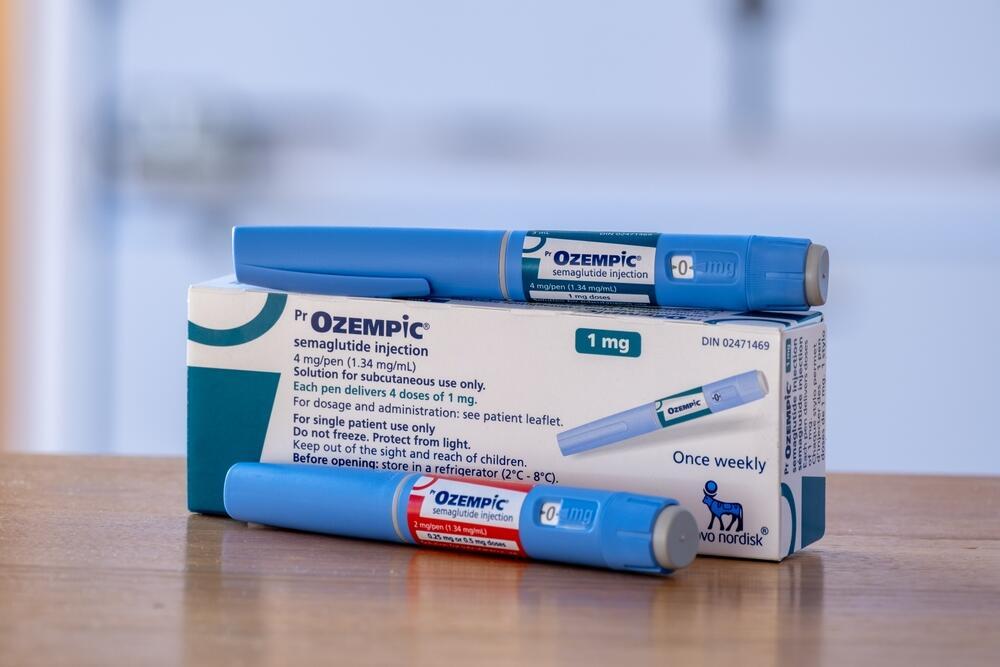Getting your Trinity Audio player ready...
The medication Ozempic (semaglutide), colloquially referred to as the "weight-loss injection" for its efficacy in managing obesity, has received regulatory approval from the European Medicines Agency (EMA) to expand its indications to include the reduction of risks associated with chronic kidney disease in patients with type 2 diabetes.
This approval follows the results of a robust, large-scale clinical trial demonstrating a 24% reduction in the risk of Chronic Kidney Disease progression among patients treated with the drug.
The GLP-1 receptor agonist drug market has witnessed exponential growth in recent years, largely driven by the success of medications like Ozempic, Wegovy, and Mounjaro in managing both obesity and T2D. With this new EMA approval, Ozempic’s utilization is expected to expand significantly, particularly in patients at high risk of kidney failure. However, the elevated cost of these medications may limit accessibility, especially in countries with insufficient public healthcare funding.
A paradigm shift in diabetes and kidney care
Dr. Yuval Horwitz, director of the nephrology clinic at Sourasky Medical Center in Tel Aviv, shed light on the broader implications of this development:
“What truly matters is preventing the complications of diabetes—chronic kidney disease, kidney transplants, heart attacks, heart failure, strokes, and more. The ultimate goal is to keep patients as healthy as possible. Until a few years ago, we lacked sufficiently effective tools beyond blood pressure control and standard recommendations for physical activity. In recent years, however, we’ve gained highly effective therapeutic options—new classes of antidiabetic medications capable of preventing both cardiovascular events and kidney disease.”
Dr. Horwitz emphasized that while Ozempic has already established itself as a key therapeutic agent for weight loss and glycemic control in T2D, emerging evidence had hinted at its nephroprotective effects.
“In this recent study, over 3,000 severely ill patients from multiple countries were evaluated. This was an extensive trial focusing on an unbalanced diabetic population with chronic kidney disease, many of whom were also obese and at very high risk of mortality, dialysis, and cardiovascular events. The results were remarkable: the drug reduced mortality by 20%, which is substantial. It also demonstrated efficacy in reducing cardiovascular disease, heart attacks, strokes, and mortality from these conditions—showing positive outcomes across every parameter examined.”
The clinical trial, published in the prestigious New England Journal of Medicine, demonstrated that treatment with semaglutide reduced the progression of chronic kidney disease by 24%, while also lowering the risk of all-cause mortality by 20% compared to placebo in patients with type 2 diabetes. Additionally, the study revealed an 18% reduction in the risk of major adverse cardiovascular events (MACE), including myocardial infarction and stroke.
The trial enrolled 3,533 participants, with 1,767 receiving Ozempic and 1,766 receiving a placebo. The median follow-up period was 3.4 years, although the trial was terminated early based on recommendations from an interim analysis. Notably, the incidence of severe adverse events was lower in the Ozempic group compared to the placebo group (49.6% vs. 53.8%).
Martin Holst Lange, Senior Vice President for Development at Novo Nordisk, the manufacturer of Ozempic, commented on the findings:
“Approximately 40% of people with type 2 diabetes develop chronic kidney disease. There is a pressing need for treatments that can slow disease progression and mitigate associated risks. With the EMA’s positive opinion, Ozempic will become the first and only GLP-1 receptor agonist proven to reduce the risk of CKD progression in adults with type 2 diabetes and chronic kidney disease.”
Get the Ynetnews app on your smartphone: Google Play: https://bit.ly/4eJ37pE | Apple App Store: https://bit.ly/3ZL7iNv
In parallel with the EMA’s approval, Novo Nordisk has submitted a similar application to the U.S. Food and Drug Administration (FDA), with a decision expected in the first half of 2025. The approval of this expanded indication is anticipated to further fuel the already surging demand for GLP-1 receptor agonists, with analysts projecting the global market for these therapies to reach $111 billion by 2033.
A new weapon against Chronic Kidney Disease
Professor Linda Shavit, director of the nephrology institute at Shaare Zedek Medical Center in Jerusalem, highlighted the importance of this development:
“This represents another crucial tool for delaying the progression of chronic kidney disease, helping us maintain our patients’ health and prevent the need for dialysis or kidney transplantation. Diabetic patients with CKD or proteinuria are complex cases requiring multiple medications—Ozempic is now a highly valuable addition to our arsenal, with robust evidence supporting its nephroprotective benefits.”
 Dr. Yuval Horwitz
Dr. Yuval HorwitzShe added that Ozempic was already being used in patients with both CKD and diabetes even prior to this study. “Roughly 50% of patients referred to nephrologists with CKD are diabetic. We were already familiar with the drug, but now we have additional data that confirms it directly benefits the kidneys.”
Chronic kidney disease is among the most severe complications of type 2 diabetes. According to the National Kidney Foundation (USA), diabetes is the leading cause of kidney failure globally. Prolonged hyperglycemia damages the microvasculature in the kidneys, gradually leading to a decline in renal function. For millions of diabetes patients, the findings of this trial represent a significant breakthrough.
“We’re no longer just talking about weight loss—that isn’t the primary story here,” explained Dr. Lior Neuman, a family medicine specialist focusing on diabetes and obesity at Maccabi Healthcare Services.
“This specific study targets diabetic patients exclusively, and that distinction is critical. We now have unequivocal evidence that Ozempic not only aids in weight loss and glycemic control but also significantly slows the progression of kidney disease in diabetic patients. This is incredibly exciting news, as until recently, we had very few effective treatment options for these patients.”
Dr. Horwitz echoed this sentiment, adding: “As a nephrologist, every new tool that allows me to prevent my patients from reaching dialysis, maintain their quality of life, and reduce hospitalizations and mortality excites me. Ozempic truly saves kidneys, hearts, and, ultimately, lives. This research is a key milestone among many recent advances in nephrology.”
Challenges ahead: Competition and cost
While Novo Nordisk continues to expand Ozempic’s indications, Eli Lilly is conducting trials to evaluate its competing GLP-1 receptor agonist, Mounjaro (tirzepatide), in patients with obesity and chronic kidney disease, with or without diabetes. However, Eli Lilly’s trial is still in the recruitment phase and is not expected to conclude until 2026.
Despite the groundbreaking success of GLP-1 drugs, their high cost has drawn criticism. Access to these medications remains highly inequitable, with many patients resorting to private purchases due to lack of insurance coverage.
When asked whether Ozempic might soon be included in Israel’s health basket for CKD patients, Prof. Shavit responded: “We would welcome that wholeheartedly. These are expensive drugs, and their popularity for weight loss has even led to the emergence of a black market. Including Ozempic in the health basket for CKD patients would be a game-changer for our patients.”
Dr. Neuman added: “Ozempic is already in the Israeli health basket for diabetic patients meeting certain criteria. I believe its indication will eventually expand to include diabetic patients with advanced chronic kidney disease.”



